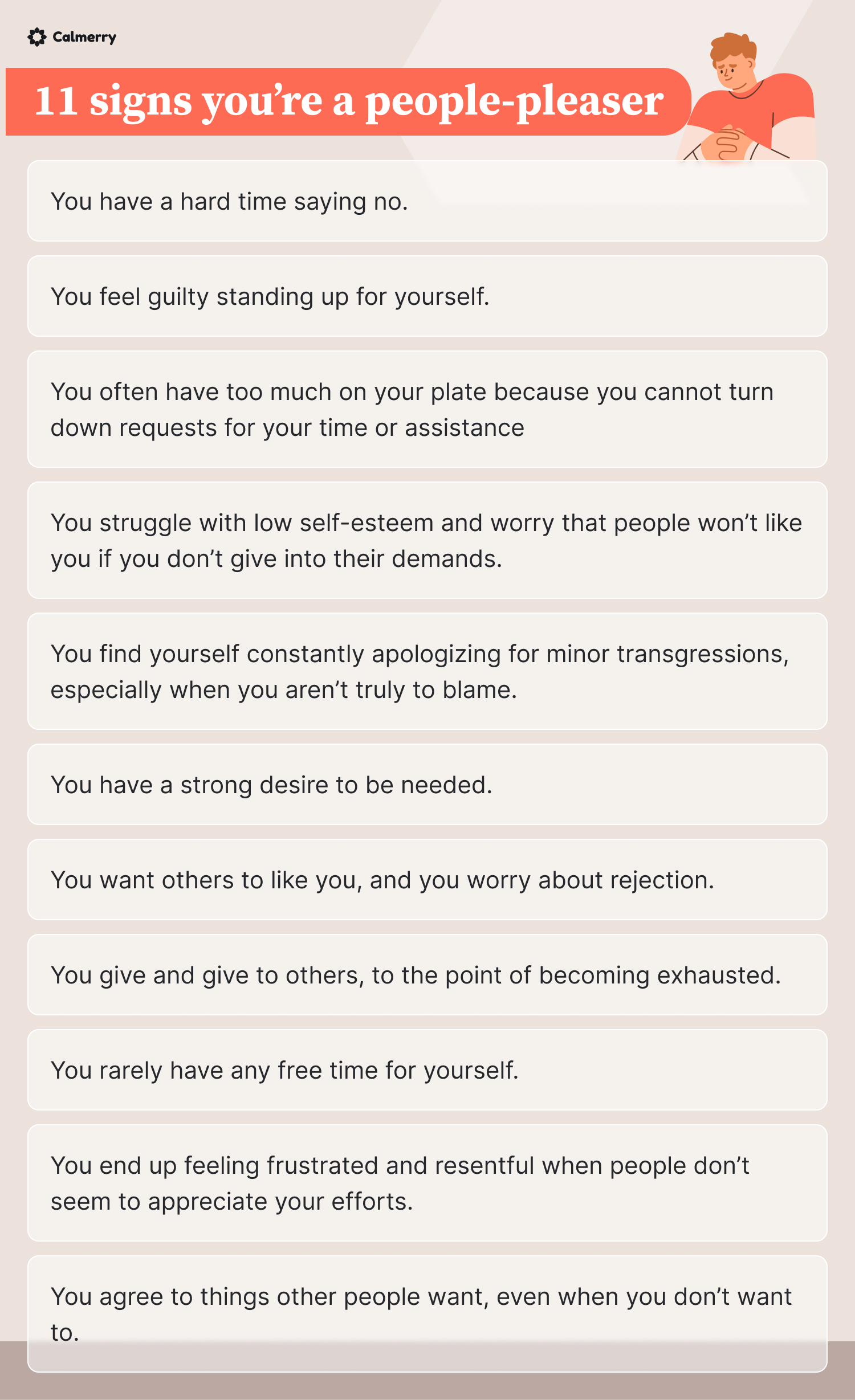How to Stop People-Pleasing and Start Feeling Your True Self

In this article
If you’re a people pleaser, maybe you’ve come to the realization that your behavior is benefiting everyone but you. Desperate to gain approval from others, you give in to everyone else’s demands, while ignoring your own needs.
People pleasers fixate on making others happy at the expense of their own needs and well-being. They tend to have a hard time saying no, and they overextend themselves trying to meet others’ needs.
While people-pleasing may gain you some friends, it’s likely to end up taking a significant toll on you. Without any time or energy to pursue your own interests, needs, and goals, you’ll end up quite unfulfilled, regardless of who likes you!
The good news is that you can learn strategies to overcome people-pleasing. We’ll discuss some of the top ways to stop being a people pleaser below.
Signs you’re a people pleaser
If you’re looking for advice on how to stop people-pleasing, you probably already know that you’re engaging in this behavior. However, it can be helpful to be sure so you know you’re seeking support for the right problem.
Showing some or all of the signs below is pretty good evidence that you’re a people pleaser:
- You have a hard time saying no.
- You feel guilty standing up for yourself.
- You often have too much on your plate because you cannot turn down requests for your time or assistance
- You struggle with low self-esteem and worry that people won’t like you if you don’t give into their demands.
- You find yourself constantly apologizing for minor transgressions, especially when you aren’t truly to blame.
- You have a strong desire to be needed.
- You want others to like you, and you worry about rejection.
- You give and give to others, to the point of becoming exhausted.
- You rarely have any free time for yourself.
- You end up feeling frustrated and resentful when people don’t seem to appreciate your efforts.
- You agree to things other people want, even when you don’t want to.

How to stop being a people-pleaser
When you notice that people-pleasing is taking a negative toll on your life, it’s probably time to make some changes. People-pleasing ultimately leaves you feeling mentally and emotionally exhausted, and it can land you in some unhealthy relationships.
Instead of continuing with your people-pleasing ways, use the strategies below to overcome this behavioral pattern.
Try to get to the root of the problem
If you’re a people pleaser, there is probably an underlying problem contributing to this behavior. In many cases, people pleasers are prone to codependency.
Codependency involves self-sacrifice and an extreme focus on others, and it often has roots in childhood. Codependent behaviors can be passed from one generation to the next, causing people to develop extreme emotional dependence on others. [1] Lampis, J., Cataudella, S., Busonera, A., & Skowron, E. A. (2017). The role of differentiation of self and dyadic adjustment in predicting codependency. Contemporary Family Therapy, 39(1), 62–72. https://doi.org/10.1007/s10591-017-9403-4
If you’re codependent, you’ll be prone to people-pleasing behaviors, because your entire focus is on “fixing” others and meeting their needs. Rather than focusing on yourself, you’ll spend all your time trying to make others happy.
– Dr. Jenni Jacobsen, PhD, Licensed Social Worker (LSW), mental health writer
If you realize that codependency is a pattern in your family, you can begin to take steps to correct your people-pleasing behavior.
Learn the motivations behind your behavior
People-pleasing behavior generally has an underlying motivation. After all, no one would sacrifice their own well-being without having some sort of reason for doing so.
In many cases, people pleasers hope to gain admiration, approval, or a self-esteem boost from the way they treat others. When they focus all their energy on making others happy, people-pleasers are sure to gain some friends.
Ultimately, this boosts their self-esteem and can make them feel better about themselves. Once you learn the motivation behind your people-pleasing tendencies, you can find other ways to have your needs met.
For instance, you might realize that you’re people-pleasing to make yourself feel competent or helpful. Rather than being a people-pleaser, you could fulfill this need through setting goals or volunteering, for instance.
Learn to set boundaries
Sometimes, people pleasers struggle with setting boundaries, which are the unspoken rules that define where one person ends and another begins.
People who have healthy boundaries are able to stand up for themselves and tell others “no” because they do not feel guilty for separating themselves from others.
On the other hand, people with unhealthy boundaries tend to give too much of themselves to others, feeling as if they are obligated to meet every demand that someone else presents.
If you learn to set healthy boundaries, you can put an end to people-pleasing tendencies. Healthy boundaries can involve asking for time to yourself, only making yourself available to assist others at certain times of day, or asking not to discuss topics that make you uncomfortable.
Practice being assertive
People pleasers are often afraid to stand up for themselves, but assertiveness can help. Rather than remaining silent when you’re feeling overextended, speak up for yourself assertively.
This can look like using “I” statements to clearly express your needs, or remaining firm but kind when declining a request for your time, money, or assistance.
Assertiveness doesn’t mean being unkind or aggressive; it simply means honestly communicating your needs and advocating for your own well-being.
If you’re not comfortable being assertive, you can find information about assertiveness training online. You can read through resources, watch videos, or even participate in an online training program.
Challenge negative self-talk
Research has shown that the need for self-love is linked to codependency, which, as we learned above, is closely related to people-pleasing. [2] Karaşar, B. (2021). Codependency: an evaluation in terms of depression, need for social approval and Self-Love/Self-Efficacy. Kastamonu EğItim Dergisi, 29(1), 117–126. https://doi.org/10.24106/kefdergi.738845
So, if you’re struggling with codependency, you’re likely to be grappling with a lack of self-love. You can overcome this problem by challenging your negative self-talk.
Perhaps you constantly tell yourself that you’re not good enough, or that no one will like you unless you give them whatever they want. Move away from negative self-talk and practice positive affirmations.
Remind yourself that you’re worthy, capable, and competent. Some positive self-talk will build up your self-esteem, leaving you less prone to people-pleasing.
– Dr. Jenni Jacobsen, PhD, Licensed Social Worker (LSW), mental health writer
Pursue your own goals
People-pleasing means you’re spending all your time and energy focused on the needs of others. Rather than fixating on others, take some time to pursue your own goals.
Think about something you’ve always wanted to achieve, and work toward it. Maybe you’ve always wanted to go back to school. Or, perhaps you want to learn a new skill or take up a fitness challenge.
Whatever it is, set a goal of your own, and spend time pursuing it. When you’re focused on your own goals, you won’t have as much time to devote to others, which will pull you away from your people-pleasing cycle.
Nurture supportive relationships
It’s helpful to have supportive people in your corner when you’re trying to overcome people-pleasing. As you heal from unhelpful behavioral patterns, focus on relationships with people who truly have your back.
This means surrounding yourself with people who understand your struggles and respect your boundaries. They should support you in taking time for yourself and giving up your habit of always saying “yes” to others.
Practice self-care
When you’re focused on meeting everyone else’s needs, you’re probably lacking in self-care. Over time, this can cause your mental and physical health to suffer, as you become exhausted from catering to everyone else.
One of the best things you can do to overcome people-pleasing is focus on self-care. Take time for rest and relaxation, and set aside time to engage in hobbies and activities you enjoy.
It’s also important to care for your physical health through regular exercise and a nutritious diet. When you make a habit out of caring for yourself, you’ll become less vulnerable to sacrificing yourself for the sake of others.
When to seek help from a therapist
Therapy can be incredibly beneficial when you’re trying to overcome people-pleasing tendencies. A therapist can help you explore deep-seated issues, develop coping strategies, and provide support as you make changes.
If you’ve tried to cope with people-pleasing on your own, but you’re not making the progress you’d like, it may be time to talk with a therapist. Sometimes, underlying mental health issues like depression or trauma are linked to people-pleasing.
In addition, people-pleasing behaviors may be related to unaddressed childhood issues, such as emotional pain stemming from neglect or emotional abuse.
A mental health professional can help you address underlying issues contributing to people-pleasing. They can also offer self-esteem therapy to boost your self-image and eliminate your need to people-please in order to gain acceptance.
Start online therapy
There is no shame in reaching out to a mental health professional if you’re struggling with people-pleasing. You can see a therapist in person, or consider online therapy to get support from the comfort and privacy of home.
At Calmerry, we can match you with your best-fit therapist who is experienced in working with people-pleasing behaviors within 1 hour. Start with a brief survey.
Lampis, J., Cataudella, S., Busonera, A., & Skowron, E. A. (2017). The role of differentiation of self and dyadic adjustment in predicting codependency. Contemporary Family Therapy, 39(1), 62–72. https://doi.org/10.1007/s10591-017-9403-4
Karaşar, B. (2021). Codependency: an evaluation in terms of depression, need for social approval and Self-Love/Self-Efficacy. Kastamonu EğItim Dergisi, 29(1), 117–126. https://doi.org/10.24106/kefdergi.738845
Kaya, Z., Kale, K., Yağan, F., & Kaya, Ş. (2024). The mediating role of resilience in the relationship between childhood emotional abuse and emotional neglect and codependency. Children and Youth Services Review, 107670. https://doi.org/10.1016/j.childyouth.2024.107670
online therapy
live video session



